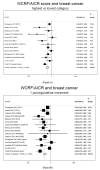Adherence to the World Cancer Research Fund/American Institute for Cancer Research Recommendations and the Risk of Breast Cancer
- PMID: 32110887
- PMCID: PMC7146587
- DOI: 10.3390/nu12030607
Adherence to the World Cancer Research Fund/American Institute for Cancer Research Recommendations and the Risk of Breast Cancer
Abstract
The World Cancer Research Fund/American Institute for Cancer Research (WCRF/AICR) introduced in 2007, and updated in 2018, nutrition-related recommendations for cancer prevention. Previous studies generally reported inverse associations of breast cancer with the 2007 recommendations, while no study has yet evaluated the association with the 2018 guidelines. We investigated the association between adherence to the 2018 WCRF/AICR recommendations and breast cancer risk in a case-control study from Italy and Switzerland (1991-2008) including 3034 incident histologically-confirmed breast cancer cases and 3392 hospital controls. Adherence to the 2018 guidelines was summarized through a score incorporating eight recommendations (body fatness, physical activity, consumption of wholegrains/vegetables/fruit/beans, "fast foods" and other processed foods high in fat, starches, or sugars, red/processed meat, sugar-sweetened drinks, alcohol, breastfeeding), with higher scores indicating higher adherence. Odds ratios (OR) were estimated using multiple logistic regression models. We also conducted a meta-analysis including 15 additional studies using random-effects models. In our case-control study, adherence to the 2018 WCRF/AICR guidelines was inversely associated with breast cancer, with ORs of 0.60 (95% confidence interval (CI), 0.51-0.70) for a score ≥5.5 vs. ≤4.25, and of 0.83 (95% CI, 0.79-0.88) for a 1-point increment. In our study, 25% of breast cancers were attributable to low-to-moderate guideline adherence. In the meta-analysis, the pooled relative risks (RRs) were 0.73 (95% CI, 0.65-0.82, p heterogeneity among studies< 0.001) for the highest vs. the lowest WCRF/AICR score category, and 0.91 (95% CI, 0.88-0.94, p heterogeneity < 0.001) for a 1-point increment. This work provides quantitative evidence that higher adherence to the WCRF/AICR recommendations reduces the risk of breast cancer, thus opening perspectives for prevention.
Keywords: breast cancer; diet; guideline adherence; lifestyle; nutrition; prevention.
Conflict of interest statement
The authors declare no conflict of interest.
Figures
Similar articles
-
Adherence to the World Cancer Research Fund/American Institute for Cancer Research recommendations and colorectal cancer risk.Eur J Cancer. 2017 Nov;85:86-94. doi: 10.1016/j.ejca.2017.08.015. Epub 2017 Sep 9. Eur J Cancer. 2017. PMID: 28892777
-
Adherence to the World Cancer Research Fund/American Institute for Cancer Research cancer prevention recommendations and breast cancer risk in the Cancer de Màma (CAMA) study.Public Health Nutr. 2015 Dec;18(18):3337-48. doi: 10.1017/S1368980015000634. Epub 2015 Mar 25. Public Health Nutr. 2015. PMID: 25805146 Free PMC article.
-
Adherence to World Cancer Research Fund/American Institute for Cancer Research recommendations and pancreatic cancer risk.Cancer Epidemiol. 2016 Feb;40:15-21. doi: 10.1016/j.canep.2015.10.026. Epub 2015 Nov 21. Cancer Epidemiol. 2016. PMID: 26605429 Free PMC article.
-
A systematic review and meta-analysis of the 2007 WCRF/AICR score in relation to cancer-related health outcomes.Ann Oncol. 2020 Mar;31(3):352-368. doi: 10.1016/j.annonc.2020.01.001. Epub 2020 Jan 8. Ann Oncol. 2020. PMID: 32067678
-
Adherence to the 2018 World Cancer Research Fund/American Institute for Cancer Research Cancer Prevention Recommendations and cancer risk: A systematic review and meta-analysis.Cancer. 2023 Sep 1;129(17):2655-2670. doi: 10.1002/cncr.34842. Epub 2023 Jun 13. Cancer. 2023. PMID: 37309215
Cited by
-
Lung Cancer Risk in Men and Compliance with the 2018 WCRF/AICR Cancer Prevention Recommendations.Nutrients. 2022 Oct 14;14(20):4295. doi: 10.3390/nu14204295. Nutrients. 2022. PMID: 36296978 Free PMC article.
-
Adherence to cancer prevention recommendations and risk of breast cancer in situ in the United Kingdom Biobank.Int J Cancer. 2022 Nov 15;151(10):1674-1683. doi: 10.1002/ijc.34183. Epub 2022 Jul 8. Int J Cancer. 2022. PMID: 35723078 Free PMC article.
-
Adherence to the 2018 World Cancer Research Fund/American Institute for Cancer Research cancer prevention recommendations and pancreatic cancer incidence and mortality: A prospective cohort study.Cancer Med. 2020 Sep;9(18):6843-6853. doi: 10.1002/cam4.3348. Epub 2020 Jul 27. Cancer Med. 2020. PMID: 32716590 Free PMC article.
-
Adherence to the World Cancer Research Fund/American Institute for Cancer Research and Korean Cancer Prevention Guidelines and cancer risk: a prospective cohort study from the Health Examinees-Gem study.Epidemiol Health. 2023;45:e2023070. doi: 10.4178/epih.e2023070. Epub 2023 Aug 1. Epidemiol Health. 2023. PMID: 37536716 Free PMC article.
-
The Mediterranean Lifestyle to Contrast Low-Grade Inflammation Behavior in Cancer.Nutrients. 2023 Mar 29;15(7):1667. doi: 10.3390/nu15071667. Nutrients. 2023. PMID: 37049508 Free PMC article. Review.
References
-
- Islami F., Goding Sauer A., Miller K.D., Siegel R.L., Fedewa S.A., Jacobs E.J., McCullough M.L., Patel A.V., Ma J., Soerjomataram I., et al. Proportion and number of cancer cases and deaths attributable to potentially modifiable risk factors in the United States. CA Cancer J. Clin. 2018;68:31–54. doi: 10.3322/caac.21440. - DOI - PubMed
-
- Chan D.S.M., Abar L., Cariolou M., Nanu N., Greenwood D.C., Bandera E.V., McTiernan A., Norat T. World Cancer Research Fund International: Continuous Update Project-systematic literature review and meta-analysis of observational cohort studies on physical activity, sedentary behavior, adiposity, and weight change and breast cancer risk. Cancer Causes Control. 2019;30:1183–1200. doi: 10.1007/s10552-019-01223-w. - DOI - PubMed


